Animal House: Disabled & Special Needs Pets Can Be Perfect Companions
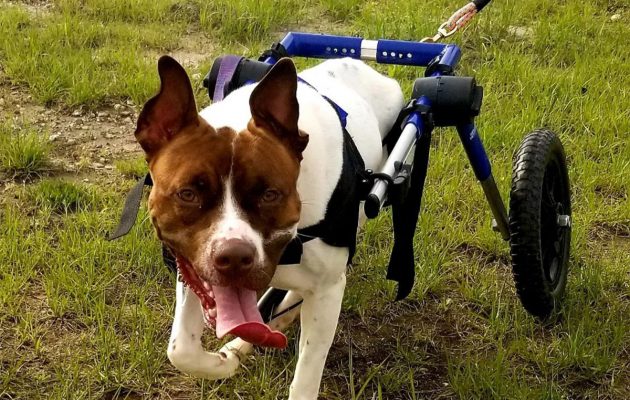
Disabled and special needs pets can become the best companions of all, according to Jacksonville’s Animal Care & Protective Services (ACPS) staff, fosters, rescuers, and owners who share incredible stories. They describe these animals’ resilience and determination to heal, recover and adapt to challenges.
Whether born with birth defects, chronic diseases, hit by cars, severely injured or disabled from accidents, many conditions that were previously a death sentence in animal shelters are now viewed differently. National shelter policies towards treating these severe animal medical conditions have dramatically changed.
Research, education, and advanced veterinarian medical and surgical treatments with ever-increasing positive outcomes have helped more disabled, and special needs pets thrive. The enlightened, compassionate attitudes of the public, animal welfare professionals, and adoption advocates for these perfectly imperfect pets mean they also receive lifesaving treatment and care.
The most common disabilities for cats and dogs, according to the Humane America Animal Foundation (HAAF), are blindness, deafness, or the loss of one limb. Many pets with special needs have undetectable minor to moderate medical conditions. These may only require extra time and patience for a pet’s slower movements and loss of appetite, or gradual hearing loss, deafness, low vision, and blindness. Other needs could include dietary requirements, medication, injections, or physical therapy, according to VCA Hospitals.
The most obviously disabled pets are amputees. After surgical recovery, amputees can be fitted with adaptive mobility devices. These include two or four-wheeled carts, wagons, slings, and harnesses that provide comfortable support or the ability to move, walk and run despite losing limbs.
With improved nutrition, protection from parasites, and advanced veterinarian care, pets live longer, healthier lives and are more likely to develop disabilities or special needs associated with aging. Unfortunately, just like senior citizens, senior pets can develop a variety of health issues or more than one medical condition like heart disease, cancer, and arthritis.
Discipline, train, and treat a disabled or special needs pet precisely the same as other family pets, just as children or grandchildren should be treated equally. Otherwise, pets will notice differences, become jealous, misbehave, or exhibit new behavioral problems.
The most important fact for anyone considering adopting a pet is that animals with a disability, special needs, or a few more birthdays are otherwise just like able-bodied or younger dogs and cats. They are still fully able to love and enjoy life with their adoptive family.
Carolyn Edwards saw firsthand the astonishing resilience of a severely injured dog’s ability to survive an infected broken leg, left untreated for at least a year. According to veterinarians, the leg had to be amputated to save Annie, the Treeing Walker Coonhound.
“Within two months, Annie was getting around on her three good legs, and now she runs, attends doggy daycare, swims with assistance in the pool, and enjoys walks!” Edwards said. “We love our foster-fail Annie. She’s the perfect example of how even animals with untreated, long-term serious injuries can be saved”.
Marcy Gallo, ACPS Shelter Manager, recently said that they have received multiple disabled animals, which has never happened before. She noted that shelter staff teaches adopters about their special needs or disabled pet, including providing a free, two-week supply of any medications.
The shelter offers a Sleepover Program that allows potential adopters to take a pet home for a two-week trial period. This allows the family time to evaluate the pet while that pet enjoys a much-needed break from the shelter, Gallo said.

ACPS disabled and special needs pets available for adoption include Luigi, 2, a creamy white and beige, mixed-breed, forty-pound neutered male dog. Luigi is on medication and has a disorder called megaesophagus. His esophagus cannot move food from his mouth to his stomach, but by sitting on a canine Bailey Chair to feed and for thirty minutes after meals, gravity does the job. Luigi has a nubby tail, is active, playful, and loves running and car rides. His behavior with children and other animals is unknown. He is recommended for a young adult or adults-only family.
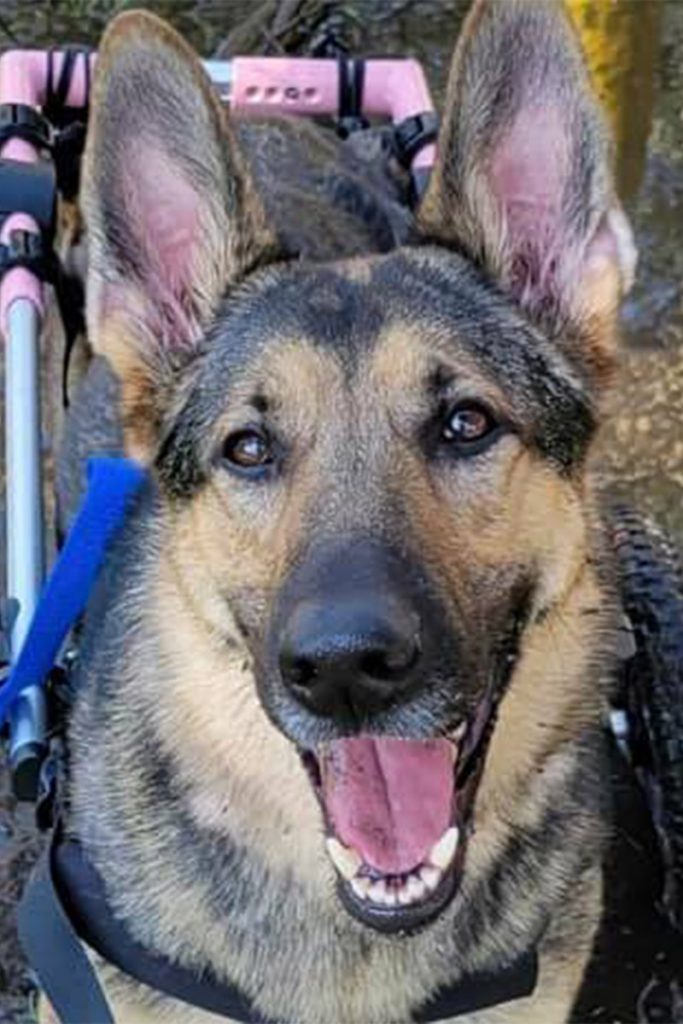
Luna, 3, is a sixty-one-pound, strikingly beautiful, spayed female German shepherd with spinal injuries. She has limited mobility in her rear legs and uses a wheelchair for walks or outside play. Luna can be out of the cart and can pull her back legs. She is a sweetheart who loves treats, playgroups, dogs, and children. Her cat manners are unknown; she alert-barks only.
Scoots, a spunky spayed female mixed-breed dog who requires a wheelchair, is currently bringing hope and joy to shelter staff, volunteers, and fosters. Scoots, 2, has begun to show increased mobility, an indication that she may regain the use of her rear legs. With slow introductions, she is dog friendly but hopeless with cats. At fifty-two pounds, this silly, sweet girl plays with children and loves squeaky chew toys, water, and puddle-splashing. Scoots is crate trained.
Gus, 7, is a diabetic, neutered male cat. He requires a Vetsulin injection into his neck scruff twice daily. Gus is friendly, outgoing, has perfect litter box manners, and likes other dogs and cats. His Vetsulin costs approximately $50 monthly plus inexpensive syringes. Injection training is simple and provided.
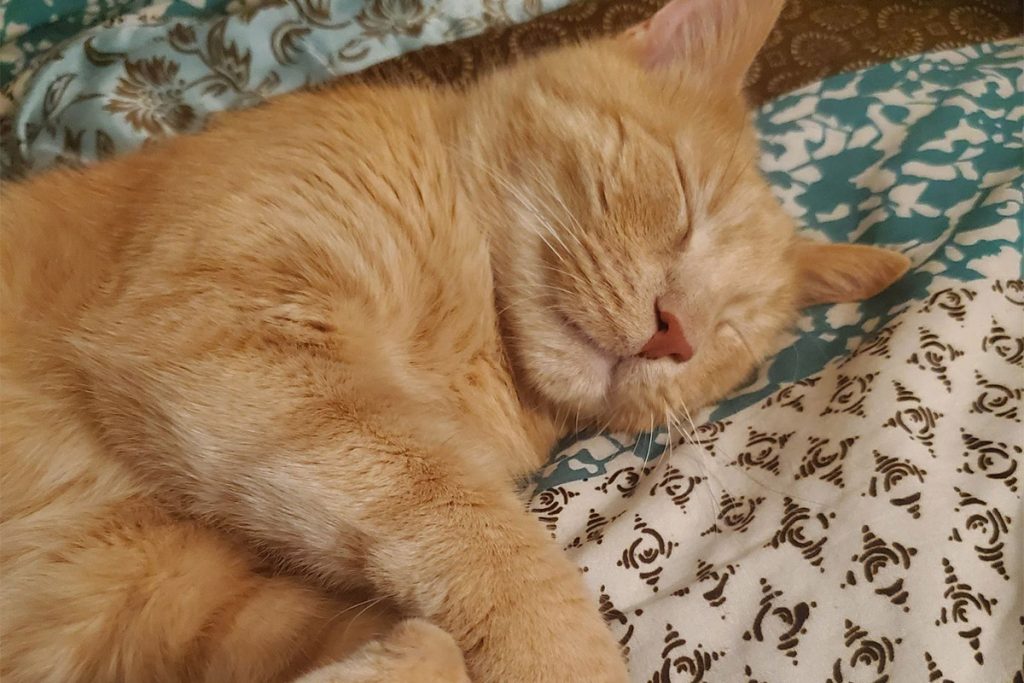
Handsome Jasper’s eyes are perennially sad because he is blind and living in a shelter, which is unbearably stressful for blind animals. Jasper desperately needs a home where he can relax and feel safe. As a young two-year-old, he will quickly learn to navigate and do everything with his new family. Jasper weighs fifty-six pounds and is a mixed breed, neutered male dog with a silky coat. He loves to snuggle in his favorite spot, cuddled on someone’s lap. Jasper is energetic, likes meeting new people, walks, and playtime. His behavior with other dogs is unknown, but no cats.
Boogey-Oogey is another dog with spinal injuries that requires a wheelchair. At forty-five pounds, he can pull his back legs and play outside of his chair. Boogey, 2, is a rich reddish-brunette, neutered male, mixed-breed dog that plays perfectly with his foster’s children. He likes wrestling his foster’s other dog, playing outside, sunbathing, and treats. His cat manners are unknown.
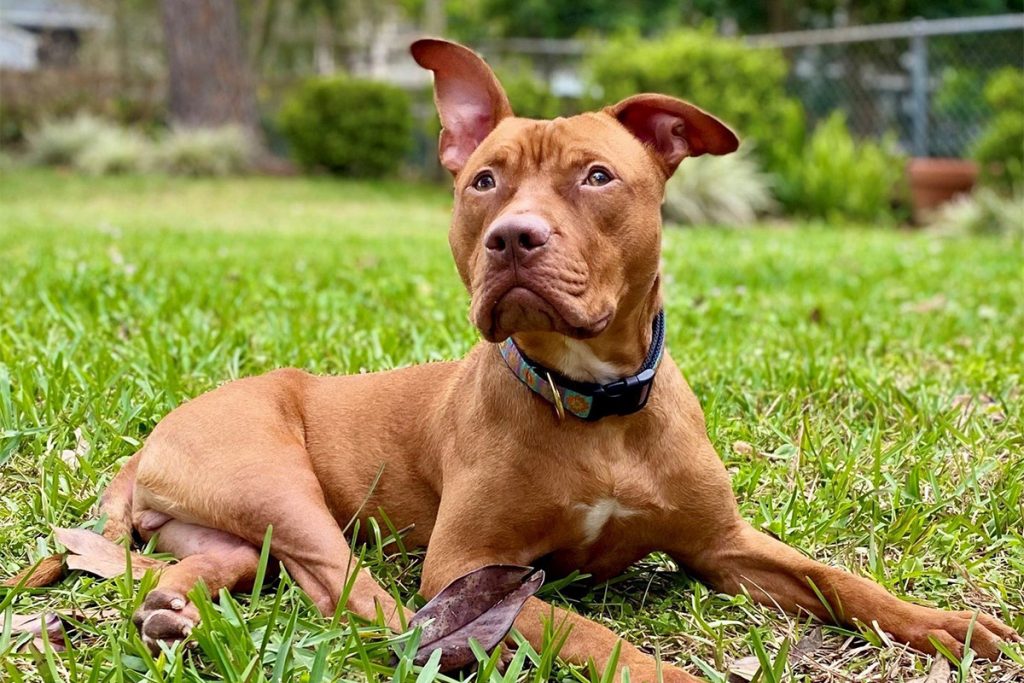
Paw Paws Pet Rescue and Foster Debbie Ayers saved adorable Obi, 1 ½, a thirty-nine pound, velvety-black Labrador retriever/Basset hound whose critically injured front paw tightly curled under his body. After the successful amputation of his front leg, he is fully recovered and ready to love his own family. Obi adores people, dogs, older children, and chew toys but is untested with cats. Obi sits beside his person to watch television. He said to please email: [email protected] to meet him asap.
The author’s own Chihuahua Silvia, 16, was diagnosed with low vision caused by cataracts after several noticeable behavioral changes. Always an ATM for cuddles and kisses, Silvia became withdrawn, hesitant, startled easily, and refused her favorite walks. She bumped into things and suffered minor, unexplained injuries.
For pets with low vision or blindness, the owner’s voice is their guide, anchor, and security. They may closely attach to one family member or even another pet, providing comfort and reassurance.
Our other rescue Chihuahua, Petey, 7, is Silvia’s personal guide dog. Silvia walks slowly and hesitantly but is always close beside him. Although Petey is rambunctious and regularly tears off wildly around the premises, Silvia stands patiently waiting until he calms down and circles right back to her side. They are inseparable.
In pets with low vision, blindness, loss of hearing, or total deafness, their other sensibilities become heightened to compensate for the disability, but their safety must be a priority. When a low vision or blind pet is adopted, it quickly learns to navigate around the home if the furniture is not rearranged. Using a harness inside the house is also helpful until these pets know the floor plan.
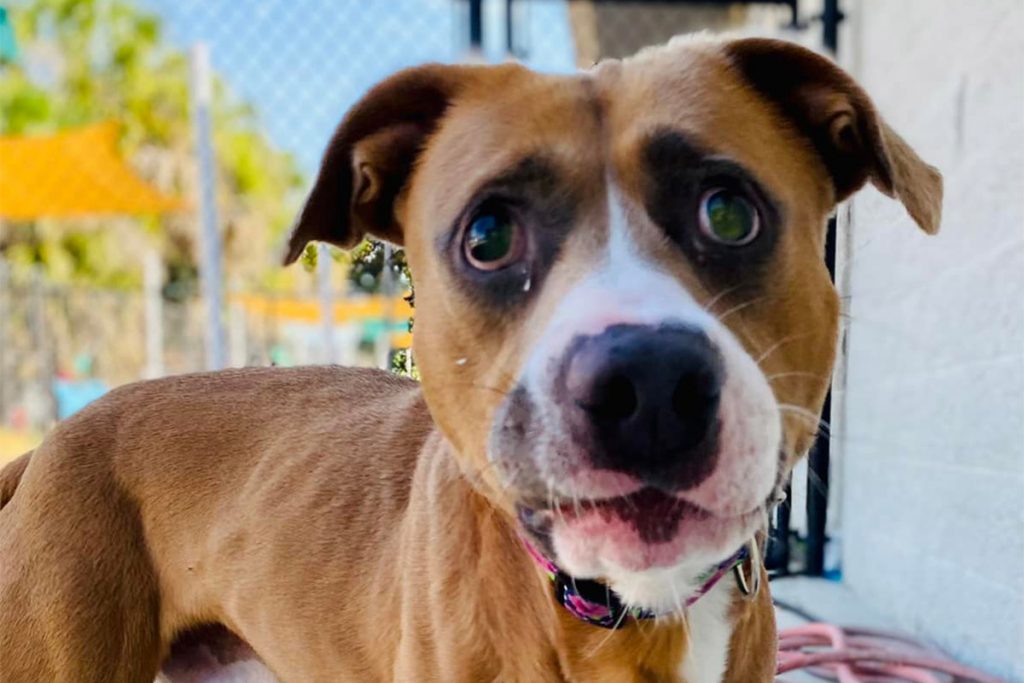
They are comforted by the predictability of knowing where their food, water, and bed are located. Moving familiar objects disorients these pets and can cause anxiety or avoidable accidents.
Stairs are also dangerous and stressful for these pets. Assistance is required, and gates to block access. Gates are also helpful to block access to other hazardous areas, and padding sharp table edges prevents injuries. Uncluttered hallways help these pets safely navigate. Harnesses are best and should always be used when outdoors. Confine these special needs pets to their room or crate when leaving home to protect them during the family’s absence.
Any pet of any age can develop an illness, disease, or disability. Aging animals cannot always alert owners to bodily changes, pain or discomfort. There are physical warning signs that a disability or other chronic ailment is developing, which is why annual veterinarian appointments are necessary. Watch for sores that do not heal, growths, discharge, changes in behavior, sleep patterns, elimination frequency or habits, and potty accidents if there were previously none. A pet may begin to bump into things, slip, hesitate or fall when walking or running, refuse to climb, or fall on stairs. There could be unexplained injuries, crying, moans, lack of appetite, or unquenchable thirst. Any of these behaviors require a trip to the veterinarian for evaluation.
ACPS ADOPTION CENTER
2020 Forest Street
Monday – Friday:
12:00 – 7:00 p.m.
Saturday & Sunday:
10:00 a.m. – 6:00 p.m.
RESOURCES:
www.manytearsrescue.org/pdfs/BlindandDeafDogs
By Julie Kerns Garmendia
Resident Community News








